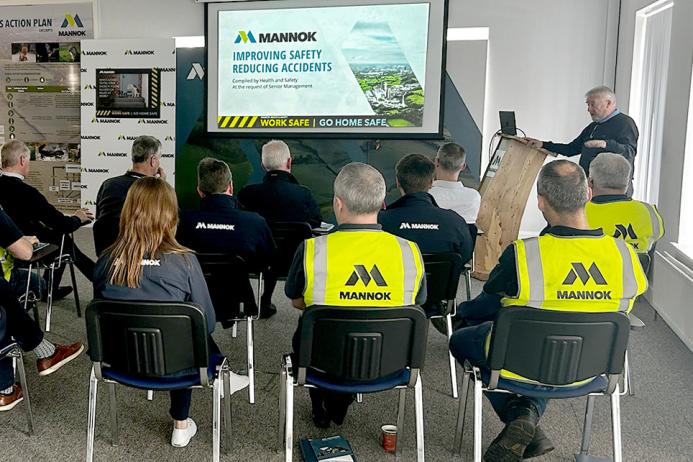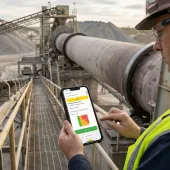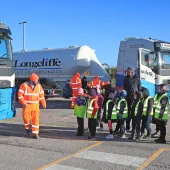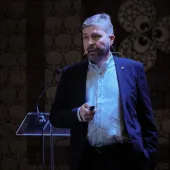Significant improvement but still more to do
That is the message of the Mannok Health & Safety Strategy document in order to meet 2030 Vision target
THE Mannok health and safety team is launching an updated Health & Safety Strategy document with the clear message that while there has been a significant improvement in health and safety within the company over the last nine years, there is still a way to go to meet the target of zero lost-time accidents by 2030, as outlined in the Mannok 2030 Vision.
The Mannok 2030 Vision, the company’s sustainability strategy, is based upon the three foundational pillars of People, Planet, and Partners. People is the first of these pillars and within it safety is the top priority.
Mannok, and industry in general, recognize that in the past many companies were often reactive to health and safety issues but there has been a steady determination to change that perception within the company.
Mannok’s aim was not just to eliminate accidents but to also change the whole culture regarding health and safety by integrating safe practices in the workplace that would focus on continuous improvement and proactive prevention.
Having the full support of management has meant that the company are now much more proactive in assessing risk and eliminating harm, and in doing so have created a much safer working environment.
Back in 2015, the drive towards achieving zero lost-time accidents began and it gathered pace when Mannok invested in a state-of-the-art Safety and Environmental Hub, which was the first step towards ensuring a new culture of openness in the recording and reporting of incidents.
It provided a cloud-based, real-time platform to enable monitoring and tracking of all accidents, incidents, and near misses, while it enhanced the ability to create and carry out audits and raise actions relating to all health and safety matters.
In 2019 the Mannok Safety and Environmental Hub was recognized as a leading example in health and safety and environmental management, winning several industry awards that year.
Individual training, induction, and the permit to work system have become key components in the push for Zero harm. All these allow Mannok to manage their employee and contractor training records and give traceability and control of all contractor movements on site as well as visibility of their associated health and safety documentation.
It is widely accepted across the industry that competent people are safer people and at Mannok the aim is to ensure that every person who is asked to perform any role will be given the best available training so that they will become fully competent to safely complete all the tasks within their job role.
This is supported by the e-learning platform, Learnupon, a flexible and ever-evolving internal training provision which is delivered face to face by Mannok’s in-house accredited tutors and provides monitored and assessed certifications for all employees.
Mannok began the journey towards the achievement of ISO 45001 accreditation in 2018. ISO 45001 is an international standard that specifies requirements for an occupational health and safety (OH&S) management system, which is intended to improve the safety and health of employees, visitors, and contractors.
In April 2023, ahead of the company’s planned schedule, Mannok were successful in achieving accreditation for ISO 45001 across all areas of the business. This was a major milestone for health and safety at Mannok and provides the management team with a structured approach to risk management, enabling a better and safer environment. The goal now is to maintain those standards and accreditation.
Employees are also encouraged to raise any safety concerns and are rewarded if their suggestion is implemented. Suggestions can be raised individually or via the safety representatives.
All of these have brought about vast improvements and there has been a significant reduction in lost-time accidents across the business, but management acknowledge that continual improvement is needed to ensure all employees and sub-contractors work safe and go home healthy every day.
In 2022/23, statistics show that there were 53 workplace fatalities on the island of Ireland, while it is estimated that on average 353 people die in Northern Ireland each year due to work-related disease.
The Mineral Products Association, of which Mannok is a member, states that the fatal six account for 94% of fatalities in the mineral products industry. The fatal six are: Contact with moving machinery and isolation; Workplace transport and pedestrian interface; Work at Height; Workplace Respirable Crystalline Silica, Struck by Moving or Falling Object; and Road Traffic Accidents.
Mannok’s road to zero lost-time accidents is based on improvements in each of these areas over the coming years and this onward journey is outlined in the safety strategy.
Mannok health and safety manager Gerry Clancy commented: ‘In a modern ever-evolving workplace, with many hazards present, there are times when experience can be a hindrance instead of a blessing. Unwillingness to adapt or change what in the past may not have hurt you, can sometimes be the biggest hazard to overcome.
‘Thankfully, that culture is changing for the better. Over the last number of years, the business has evolved and adapted to new real-time recording and reporting systems, while new modern machinery and safety improvements and interventions, alongside several new different production processes, have helped.
‘There have also been external challenges, such as the Covid pandemic and Brexit, to name just two. All these, in my opinion, have made the existing workforce more resilient and more amenable to change. And these significant events have helped change people’s opinions and perception of what a good safety culture at work is all about.
‘Worker participation and management buy-in have been key to this success, but without this continued involvement at every level progress will be slow.
‘Let us all now refocus on the achievement of zero lost-time accidents by 2030, and beyond. Given the progress made over the last nine years, this is a very achievable target.
‘Going back to experience, change, and learning; I have found that if you are not willing to change, no one can help you. But if you are determined to change, no one can stop you. Making the wrong decision could someday be life-changing or fatal for you.
‘Work safe, go home safe.’










